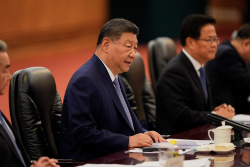A New York judge on Tuesday dismissed two charges of terrorism against Luigi Mangione, the man allegedly behind the fatal shooting of United Healthcare CEO Brian Thompson last December. The decision came during Mangione's pretrial hearing earlier this week, which was the 27-year-old's first court appearance in five months, according to Newsweek. Justice Gregory Carro of the New York City Criminal Court ruled that while prosecutors offered sufficient evidence to support several homicide charges, including second-degree murder, there was insufficient evidence to support a terrorism charge under state law.
Mangione had previously been charged with first-degree murder in furtherance of an act of terrorism and second-degree murder as a crime of terrorism. Prosecutors argued that Mangione's targeted assassination of Thompson was motivated by perceived injustices in the U.S. health care system and that Mangione intended to "violently broadcast a social and political message to the public at large," citing statements he made at the time of his arrest, as well as writings that were recovered from his personal belongings. Despite concurring that Mangione's actions likely had ideological motives, Carro stated, "there is no indication that a murder committed for ideological reasons…fits within the definition of terrorism," explaining that terrorism requires "a desire to terrorize the public, inspire widespread fear, engage in a broader campaign of violence, or to conspire with organized terrorist groups."
Had Carro sided with prosecutors, the terrorism designation would have "boosted the 'degree' of murder into the first-degree range," which would have "enhanced his sentencing exposure," explains Madeleine Lippey, a public defender and trial attorney. Mangione still faces one count of second-degree murder and eight weapons-related charges under New York law, convictions which could result in a sentence of 25 years to life, reports CBS News. Accompanying these are additional state charges in Pennsylvania, and federal charges that include "two counts of stalking, one firearms offense, and murder through the use of a firearm," writes ABC. These federal charges make Mangione eligible for the death penalty, and U.S. Attorney General Pam Bondi has publicly encouraged prosecutors to pursue capital punishment in the case. Proceedings are scheduled to resume on December 1.
Legal analysts say the ruling narrows the scope of the case and reinforces statutory limits on how terrorism laws can be applied. Jonathan Hafetz, a professor at Seton Hall Law School, told NBC News that the ruling constitutes "a well-reasoned decision." He added that "broadly labeling violence, even horrific violence as in this case, as terrorism can be misused for political purposes and have a chilling consequence on free expression."
Terrorism laws in the U.S. have often been stretched beyond their intent—used not just to punish organized plots, but to stack charges in politically charged cases. In recent years, efforts to expand domestic terrorism laws—spurred by the half-hearted putsch at the U.S. Capitol on January 6, 2021—have raised concerns about their potential use against protest movements. This pattern of applying terrorism labels to politically motivated acts has resurfaced in the wake of the September 10 assassination of conservative activist and commentator Charlie Kirk—another high-profile killing with apparent political motivations—which some public figures and media outlets have already labeled as an act of terrorism.
The instinct to label politically motivated murders as terrorism reflects a broader trend of using expansive charges to match a crime's perceived moral weight, even when the effects are mostly symbolic. The terrorism label does not make society any safer because, as Reason's Matthew Petti points out, "killing and kidnapping, of course, are already illegal." All it does is offer the state another rhetorical weapon. Mangione's case reflects this reality. Whether he is guilty of terrorism or not is functionally irrelevant, since the underlying homicide and firearms charges remain intact, as do the severe penalties they inevitably carry.
The post Judge to Mangione Prosecutors: Not All Political Murder Is Legally 'Terrorism' appeared first on Reason.com.













 Bengali (Bangladesh) ·
Bengali (Bangladesh) ·  English (United States) ·
English (United States) ·